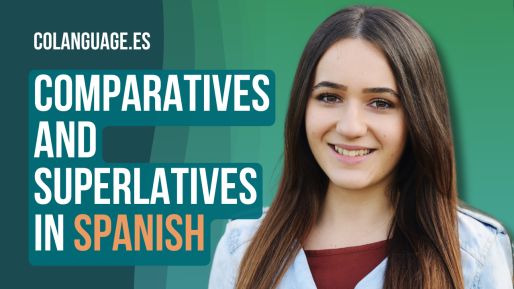Nouns in Spanish (recognizing gender and forming plurals) Share Copied!
Spanish Body parts A1 Day to day
In this lesson, we are going to learn the nouns in Spanish. Let's get straight to it!
<< Partes del cuerpo (Body parts)
Video
Podcast
What are nouns?
A noun is a word that names a living being, thing, or idea.
-
El perro (The dog) living being
-
El libro (The book) thing
-
El amor (The love) idea
Recognising the gender of nouns in Spanish
Recognizing the gender of nouns in Spanish is an important step in mastering the language.
Singular nouns: ending in "-o"
A noun ending in "-o" is usually masculine, and a noun ending in "-a" is usually feminine.
| Gender | Spanish | English |
|---|---|---|
| Masculine | El amigo | The friend |
| Feminine | La amiga | The friend |
Singular nouns: ending with a consonant
Some masculine nouns ending with a consonant become feminine by adding an "-a".
| Gender | Spanish | English |
|---|---|---|
| Masculine | El profesor | The teacher |
| Feminine | La profesora | The teacher |
Same endings for masculine and feminine nouns
There are also exceptions where the same noun is used both for female and male.
| Gender | Spanish | English |
|---|---|---|
| Masculine | El dentista | The dentist |
| Feminine | La dentista | The dentist |
| Masculine and feminine | La persona | The person |
Singular masculine nouns
The names of the week, months, languages, rivers, mountains and seas are always masculine.
| Spanish | English |
|---|---|
| El martes | Tuesday |
| El francés | French |
| El Everest | Everest |
Singular nouns with different meanings
Some nouns change their meaning depending on their gender.
| Gender | Spanish | English |
|---|---|---|
| Masculine | El cura | The priest |
| Feminine | La cura | The cure |
Different nouns for the masculine and feminine nouns
Sometimes, there are separate nouns for the masculine and feminine forms.
| Gender | Spanish | English |
|---|---|---|
| Masculine | El toro | The bull |
| Feminine | La vaca | The cow |
Some Spanish nouns do not follow the typical gender or plural rules, so it is important to memorize the exceptions.
La mano (The hand) the noun is feminine, even though it ends in "-o".
Listening exercise
This listening exercise puts into practice what you have learned before.
| Spanish | English |
|---|---|
| Él es una buena persona. | He is a good person. |
| La vaca está pastando en el campo. | The cow is grazing in the field. |
| El médico te puede hacer la cura. | The doctor can make the cure for you. |
| El Everest es la montaña más alta. | Everest is the tallest mountain. |
Forming the plural of nouns in Spanish
In Spanish, forming the plural of nouns may seem simple at first, but there are several rules and exceptions to keep in mind.
Plural nouns: ending in "-s"
Add "-s" to nouns ending in a vowel which don't have an accent.
| Gender and number | Spanish | English |
|---|---|---|
| Masculine, singular | El chico | The boy |
| Masculine, plural | Los chicos | The boys |
| Feminine, singular | La casa | The house |
| Feminine, plural | Las casas | The houses |
Plural nouns: ending in "-es"
Add "-es" to nouns ending in a consonant.
| Gender and number | Spanish | English |
|---|---|---|
| Feminine, singular | La ciudad | The city |
| Feminine, plural | Las ciudades | The cities |
Plural nouns: ending with accented vowel
Nouns ending in an accented vowel, "-n" or "-s", drop the accent in the plural form.
| Gender and number | Spanish | English |
|---|---|---|
| Feminine, singular | La canción | The song |
| Feminine, plural | Las canciones | The songs |
Plural nouns: ending in "-z"
Nouns ending in "-z" change to "-c" in plural.
| Gender and number | Spanish | English |
|---|---|---|
| Feminine, singular | La luz | The light |
| Feminine, plural | Las luces | The lights |
Exceptions to the rules of agreement: plural nouns
Nouns ending in "-s" with an unstressed final vowel do not change in plural.
| Gender and number | Spanish | English |
|---|---|---|
| Masculine, singular | El paraguas | The umbrella |
| Masculine, plural | Los paraguas | The umbrellas |
Spanish nouns can also be classified as countable, that have both singular and plural forms, or uncountable, that do not have a plural form.
El libro (The book) - Los libros (The books)countable
El aire (The air) uncountable
Listening exercise
In this listening exercise you will practise the plural form of nouns in Spanish.
| Spanish | English |
|---|---|
| ¿Te gustan las casas? | Do you like the houses? |
| He visitado muchas ciudades. | I have visited many cities. |
| ¿Has escuchado las canciones? | Have you listened to the songs? |
| Lleva dos paraguas, puede llover. | Bring two umbrellas, it might rain. |
Key takeaways
Here is a quick summary of this lesson.
- A noun is a word that names a living being, thing, or idea.
- Nouns can also be classified as countable or uncountable.
- Nouns can vary depending on their gender and number.
Subscribe to our social media channels to get free daily exercises!



